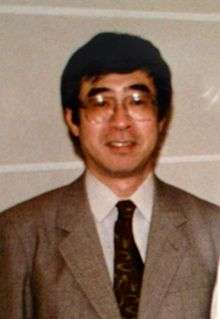Tadatoshi Miyagawa
Tadatoshi Miyagawa (水谷川忠俊, Miyagawa Tadatoshi, born 9 December 1935)[1] is a Japanese composer, a Gagaku performer and researcher, as well as a music arranger. His former last and first name was Konoe Toshitake (近衛俊健).[1]
Tadatoshi Miyagawa | |
|---|---|
水谷川忠俊 | |
 Tadatoshi Miyagawa in 1994. | |
| Born | Konoe Toshitake 9 December 1935 |
| Alma mater | Madrid Royal Academy of Music, Berlin University of Arts |
| Occupation | Composer, Gagaku performer and researcher, music arranger |
| Spouse(s) | Sakiko Ano ( m. 1964) |
| Children |
|
| Parent(s) |
|
| Relatives |
|
Career
He was born in the city of Osaka, Higashi-ku, Kyuhoji as the second son (illegitimate child) to Hidemaro Konoye of the Konoe family.[2] His mother was Fumiko Tsuboi (坪井文子). His father, Hidemaro, registered his birth certificate at the East Ward (Higashiku) city hall in Osaka on 22 July 1937.[3]
On 19 October 1939, he was adopted by the youngest brother of his father Tadamaro Miyagawa (水谷川忠麿) and he was renamed Tadatoshi (忠俊).[1] His youngest memory was being in an atelier of Tadamaro in Sendagaya, Tokyo and has no recollection of his real birth mother.[3] While he was studying at the Gakushūin Elementary School they moved to Nara and he went to the elementary school (co-ed) which is attached to the women University in Nara and he also finished junior high and high school at the same school. Upon graduating high school he moved back to Tokyo and became assistant to Naozumi Yamamoto who is a composer and conductor.
In August 1962, he passed the exam to be a full scholarship student at the Madrid Royal Conservatory of Music in Spain.[4] In 1963, he studied in the Berlin Municipal Conservatory of Music (which is now the Berlin University of the Arts, or UdK). His first daughter, Yoko, was born in Berlin, West Germany. In 1968, he returned to Japan just before his second daughter was born.
His brother Hidetake Konoe is also a composer and conductor. His wife, Sakiko, is the daughter of viscount Suefusa Ano (阿野季房) from the Ano family of Northern Fujiwara clan. Sakiko was a classmate of his from the Gakushūin Elementary School in Tokyo where the children of the Imperial aristocracy (Kuge) were educated.[4] His oldest daughter, Yoko Miyagawa, is a violinist and his second daughter Yuko Miyagawa is a cellist.
Movies
Folk song
Summer Festival them song fr:Matsumoto Bon Bon
TV drama music
- TBS "Yasubee's Ocean" (1969 - 1970)
- Fuji TV "White Terror" (1975)
- NHK "New Western circumstances (3) Miso soup fanatics go to Europe" (1977)
- TV Tokyo "The Dangerous Evening that Wives Bought" (1988)
Ancestry
As a patrilineal descendant of the Konoe family, Miyagawa is a nephew of former Japanese Prime Minister Konoe Fumimaro, and is a first cousin once removed of both the former prime minister Hosokawa Morihiro and his brother Tadateru Konoe. By virtue of his descent from the Konoe family, he is related to the Japanese imperial family several times over. Also, as a great-great-grandson of Shimazu Narinobu, the ninth Lord of the Satsuma Domain, he is a third cousin once removed of the late Empress Kōjun and thereby a third cousin twice removed of the present Emperor, Akihito, and his siblings.
| Ancestors of Tadatoshi Miyagawa[5] | |||||||||||||||||||||||||||||||||||||||||||||||||||||||||||||||||||||||||||||||||||||||||||||||||||||||||||||||||||||||||||||||||||||||||||||||||||||||||||||||||||||||||||||||||||||||||||||||||||||||||||||||||||||||||||||||||||||||||||||||||||||||||||||||||||||||||||||||||||||||||||||||||||||||||||||||||||||||||||||||||||||||||||||||||||||||||||||||||||||||||||||||||||||||||||||||||||||||||||||||||||||||||||||||||||||||||||||||||||||||||||||||||||||||||||||||||||
|---|---|---|---|---|---|---|---|---|---|---|---|---|---|---|---|---|---|---|---|---|---|---|---|---|---|---|---|---|---|---|---|---|---|---|---|---|---|---|---|---|---|---|---|---|---|---|---|---|---|---|---|---|---|---|---|---|---|---|---|---|---|---|---|---|---|---|---|---|---|---|---|---|---|---|---|---|---|---|---|---|---|---|---|---|---|---|---|---|---|---|---|---|---|---|---|---|---|---|---|---|---|---|---|---|---|---|---|---|---|---|---|---|---|---|---|---|---|---|---|---|---|---|---|---|---|---|---|---|---|---|---|---|---|---|---|---|---|---|---|---|---|---|---|---|---|---|---|---|---|---|---|---|---|---|---|---|---|---|---|---|---|---|---|---|---|---|---|---|---|---|---|---|---|---|---|---|---|---|---|---|---|---|---|---|---|---|---|---|---|---|---|---|---|---|---|---|---|---|---|---|---|---|---|---|---|---|---|---|---|---|---|---|---|---|---|---|---|---|---|---|---|---|---|---|---|---|---|---|---|---|---|---|---|---|---|---|---|---|---|---|---|---|---|---|---|---|---|---|---|---|---|---|---|---|---|---|---|---|---|---|---|---|---|---|---|---|---|---|---|---|---|---|---|---|---|---|---|---|---|---|---|---|---|---|---|---|---|---|---|---|---|---|---|---|---|---|---|---|---|---|---|---|---|---|---|---|---|---|---|---|---|---|---|---|---|---|---|---|---|---|---|---|---|---|---|---|---|---|---|---|---|---|---|---|---|---|---|---|---|---|---|---|---|---|---|---|---|---|---|---|---|---|---|---|---|---|---|---|---|---|---|---|---|---|---|---|---|---|---|---|---|---|---|---|---|---|---|---|---|---|---|---|---|---|---|---|---|---|---|---|---|---|---|---|---|---|---|---|---|---|---|---|---|---|---|---|---|---|---|---|---|---|---|---|---|---|---|---|---|---|---|---|---|---|---|---|---|---|---|---|---|---|---|---|---|---|---|---|---|---|---|---|---|---|---|---|---|---|---|---|---|---|---|---|---|---|---|---|---|---|---|---|---|---|---|---|---|
| |||||||||||||||||||||||||||||||||||||||||||||||||||||||||||||||||||||||||||||||||||||||||||||||||||||||||||||||||||||||||||||||||||||||||||||||||||||||||||||||||||||||||||||||||||||||||||||||||||||||||||||||||||||||||||||||||||||||||||||||||||||||||||||||||||||||||||||||||||||||||||||||||||||||||||||||||||||||||||||||||||||||||||||||||||||||||||||||||||||||||||||||||||||||||||||||||||||||||||||||||||||||||||||||||||||||||||||||||||||||||||||||||||||||||||||||||||
Patrilineal descent
| Patrilineal descent |
|---|
|
Miyagawa's patriline is the line from which he is descended father to son.
|
References
- Oono Kaoru (大野芳) "Konoe Hidemaro" (近衛秀麿) p.249
- Oono (大野)、p.279。
- Oono Kaoru (大野芳) "Konoe Hidemaro" (近衛秀麿) p.250
- 大野、p.390。
- "Genealogy". Reichsarchiv. Retrieved 19 September 2017. (in Japanese)
- Ohno Yoshi "Konoe Hidemaro - A man who made a Japanese orchestra" Kodansha, 2006. ISBN 4-06-212490-4